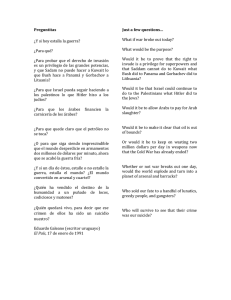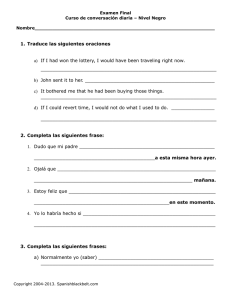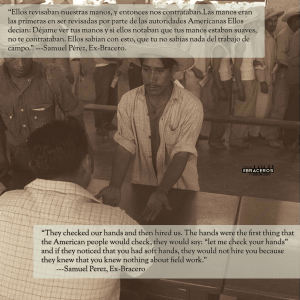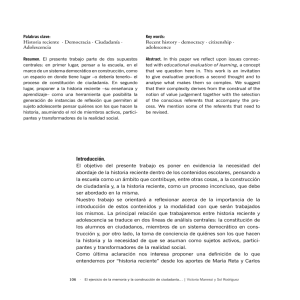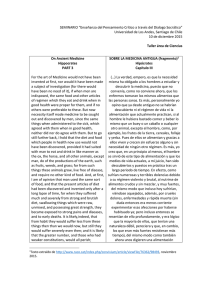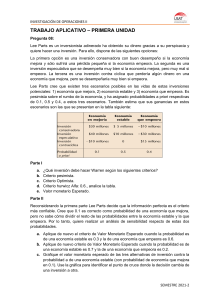The `predictive` and `hypothetical` meanings English
Anuncio
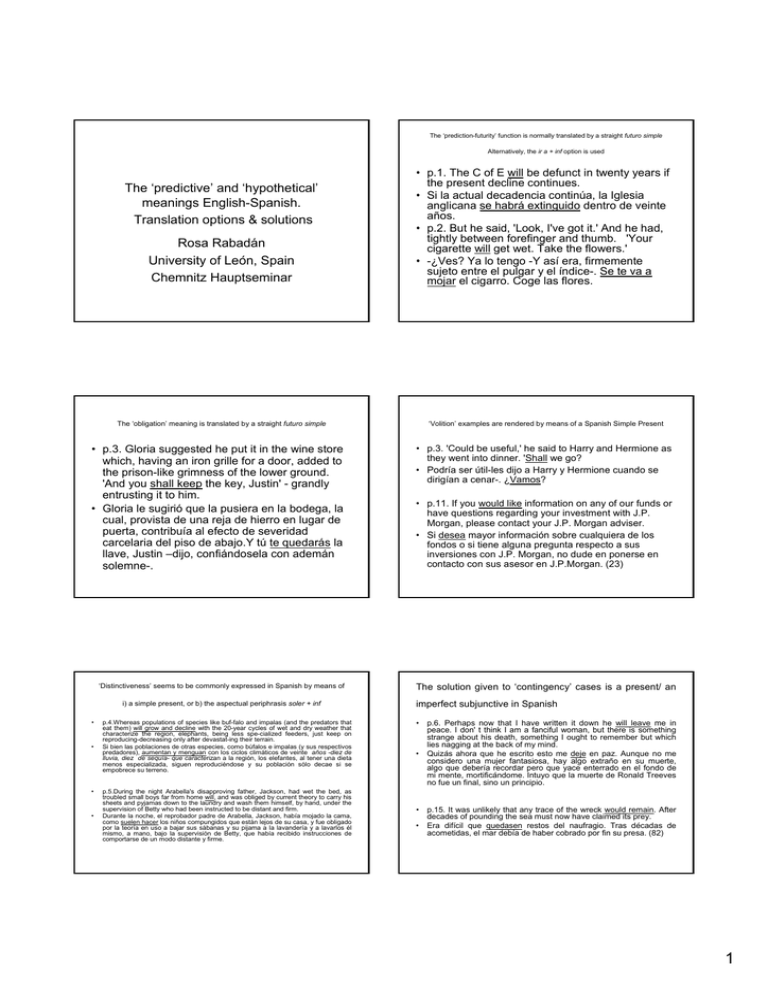
The ‘prediction-futurity’ function is normally translated by a straight futuro simple Alternatively, the ir a + inf option is used The ‘predictive’ and ‘hypothetical’ meanings English-Spanish. Translation options & solutions Rosa Rabadán University of León, Spain Chemnitz Hauptseminar The ‘obligation’ meaning is translated by a straight futuro simple • p.3. Gloria suggested he put it in the wine store which, having an iron grille for a door, added to the prison-like grimness of the lower ground. 'And you shall keep the key, Justin' - grandly entrusting it to him. • Gloria le sugirió que la pusiera en la bodega, la cual, provista de una reja de hierro en lugar de puerta, contribuía al efecto de severidad carcelaria del piso de abajo.Y tú te quedarás la llave, Justin –dijo, confiándosela con ademán solemne-. ‘Distinctiveness’ seems to be commonly expressed in Spanish by means of i) a simple present, or b) the aspectual periphrasis soler + inf • • • • p.4.Whereas populations of species like buf-falo and impalas (and the predators that eat them) will grow and decline with the 20-year cycles of wet and dry weather that characterize the region, elephants, being less spe-cialized feeders, just keep on reproducing-decreasing only after devastat-ing their terrain. Si bien las poblaciones de otras especies, como búfalos e impalas (y sus respectivos predadores), aumentan y menguan con los ciclos climáticos de veinte años -diez de lluvia, diez de sequía- que caracterizan a la región, los elefantes, al tener una dieta menos especializada, siguen reproduciéndose y su población sólo decae si se empobrece su terreno. p.5.During the night Arabella's disapproving father, Jackson, had wet the bed, as troubled small boys far from home will, and was obliged by current theory to carry his sheets and pyjamas down to the laundry and wash them himself, by hand, under the supervision of Betty who had been instructed to be distant and firm. Durante la noche, el reprobador padre de Arabella, Jackson, había mojado la cama, como suelen hacer los niños compungidos que están lejos de su casa, y fue obligado por la teoría en uso a bajar sus sábanas y su pijama a la lavandería y a lavarlos él mismo, a mano, bajo la supervisión de Betty, que había recibido instrucciones de comportarse de un modo distante y firme. • p.1. The C of E will be defunct in twenty years if the present decline continues. • Si la actual decadencia continúa, la Iglesia anglicana se habrá extinguido dentro de veinte años. • p.2. But he said, 'Look, I've got it.' And he had, tightly between forefinger and thumb. 'Your cigarette will get wet. Take the flowers.' • -¿Ves? Ya lo tengo -Y así era, firmemente sujeto entre el pulgar y el índice-. Se te va a mojar el cigarro. Coge las flores. ‘Volition’ examples are rendered by means of a Spanish Simple Present • p.3. 'Could be useful,' he said to Harry and Hermione as they went into dinner. 'Shall we go? • Podría ser útil-les dijo a Harry y Hermione cuando se dirigían a cenar-. ¿Vamos? • p.11. If you would like information on any of our funds or have questions regarding your investment with J.P. Morgan, please contact your J.P. Morgan adviser. • Si desea mayor información sobre cualquiera de los fondos o si tiene alguna pregunta respecto a sus inversiones con J.P. Morgan, no dude en ponerse en contacto con sus asesor en J.P.Morgan. (23) The solution given to ‘contingency’ cases is a present/ an imperfect subjunctive in Spanish • p.6. Perhaps now that I have written it down he will leave me in peace. I don' t think I am a fanciful woman, but there is something strange about his death, something I ought to remember but which lies nagging at the back of my mind. • Quizás ahora que he escrito esto me deje en paz. Aunque no me considero una mujer fantasiosa, hay algo extraño en su muerte, algo que debería recordar pero que yace enterrado en el fondo de mi mente, mortificándome. Intuyo que la muerte de Ronald Treeves no fue un final, sino un principio. • p.15. It was unlikely that any trace of the wreck would remain. After decades of pounding the sea must now have claimed its prey. • Era difícil que quedasen restos del naufragio. Tras décadas de acometidas, el mar debía de haber cobrado por fin su presa. (82) 1 The ‘hypothetical senses’ are regularly translated by a straight The ‘future-in-the-past’ meaning is translated either by a condicional simple straight conditional tense or a modal construction. • p.8.I have no doubt that there would be a road system through these mountains. That is what you do. • No me cabe duda de que existiría una red viaria para atravesar las montañas. Es vuestra manera de actuar. (100) • p.9. As that bipedal ape evolved into what would become us, other mammals came and went. • Mientras el simio bípedo evolucionaba hacia lo que un día seríamos los humanos actuales, otros mamíferos aparecían y desaparecían.(87) • p.10. But when a catastrophic asteroid or comet -maybe a few comets, as some scientists are now arguing- finished off the dinosaurs 65 million years ago, mammals got the most important evolutionary opportunity they would ever have. • Pero hace 65 millones de años, cuando el catastrófico impacto de un asteroide o de un cometa (quizá de varios cometas) acabó con los dinosaurios, los mamíferos tuvieron la mejor oportunidad evolutiva posible. (83) ‘Habit in the past’ is translated in all cases by means of an imperfecto For ‘conjecture‘ the translation choice is an ‘imperfect’ • p.12. He would read or write or sit back silently against the curved wall of the cabin while Sadie imposed on their small world her ordered if eccentric domesticity . • Él leía, escribía o se sentaba en silencio contra la curva pared de la cabina mientras Sadie imponía su ordenada aunque excéntrica domesticidad al pequeño mundo de ambos.(81) • p.13. Father Martin had been on the staff when he last visited but must have retired long ago; he would be eighty by now. • Aunque el padre Martin seguía allí cuando visitó el lugar por última vez, sin duda se habría retirado ya; debía de tener ochenta años. (74) Examples showing an ‘irrealis’ meaning are translated by an ‘imperfect’, or a ‘subjunctive past perfect’ • p.14. If the Warden of the college and most of the staff hadn’t been sitting there like a row of black-gowned vigilantes the Coroner would probably have found the courage to return a proper verdict. • Si el director de la escuela y la mayoría del personal no hubiesen estado allí, como un grupo de vigilantes para policiales con sotana, es posible que el juez se hubiera armado de valor para emitir un fallo apropiado. (66) ‘Contingency’ is a present/ an imperfect subjunctive in Spanish • p.15. It was unlikely that any trace of the wreck would remain. After decades of pounding the sea must now have claimed its prey. • Era difícil que quedasen restos del naufragio. Tras décadas de acometidas, el mar debía de haber cobrado por fin su presa. (82) 2
